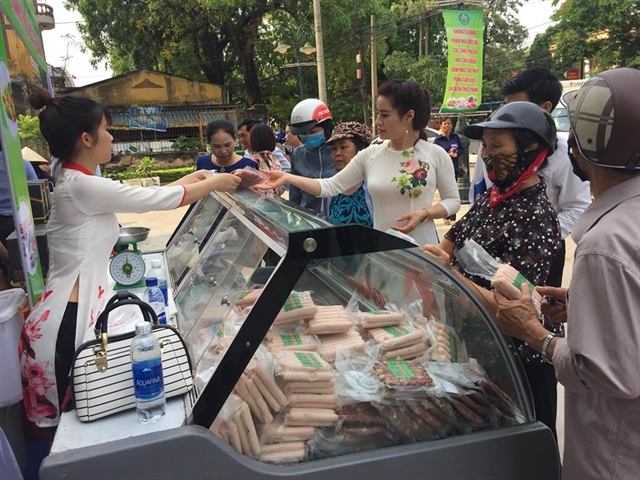 Economy
Economy

 |
| People purchase goods outside the conference on introducing and connecting the supply and demand of safe agricultural and food products in Bắc Giang Province. — VNS Photo |
BẮC GIANG — With the Lunar New Year 2024 coming up, Bắc Giang Province has developed a plan to ensure there is enough supply of essential goods for citizens.
The consumer purchasing surge is expected in the days preceding and following Tết (Lunar New Year) 2024. There is high demand for fresh food, technology-related food items, and premium Vietnamese cuisine. Consequently, the province has partnered with companies to ensure the production and quality of supplies.
Trần Quang Tấn, director of Bắc Giang Department of Industry and Trade, anticipates a 2 to 5 percent rise in Tết 2024 spending in the province compared to Tết 2023.
During this holiday, customers tend to purchase a lot of high-quality Vietnamese products. These include candies, wine, beer, and low-alcoholic beverages, which come in attractive designs and packaging. In addition to fresh produce from local markets, processed foods are also popular and can be bought in nearby supermarkets and convenience stores.
To ensure supplies and maintain stability in the commodities market during the last few months and the Lunar New Year of 2024, Bắc Giang province has developed a plan to provide necessities worth VNĐ4.3 trillion (US$179 million). The supplies include approximately 1,900 tonnes of rice and beans, 7,000 tonnes of fresh food, 700 tonnes of various green vegetables, and 90,400 metric tonnes of gasoline.
Moreover, local traders and businesses are ready to meet the demand for various commodities, including fresh flowers, ornamental plants, and dried agricultural products.
The Market Management Department of Bắc Giang Province will address issues of smuggling, trade fraud, and counterfeit goods in the last few months. In addition, it will work with relevant agencies to conduct inspections to ensure the compliance with legal regulations in business and production.
Besides that, enterprises should plan the production and supply of goods, meanwhile, participate in programmes connecting supply and demand, and ensure the quality, safety, and design of their products. Moreover, businesses must avoid producing or trading banned, counterfeit, poor-quality, or intellectual property-violating goods.
The province also encourages businesses to diversify business forms, expand networks, and organise self-selected sales points, one-price sales, and gift bags for residential areas, zones, and clusters. — VNS




